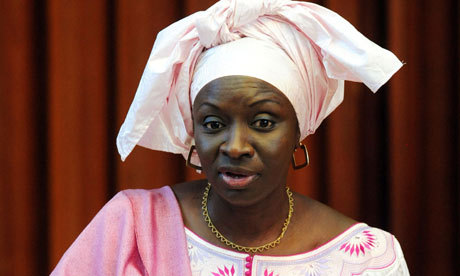Here’s A Recent Interview I Did With Futurism.

Here’s a recent interview I did with Futurism.
More Posts from Dotmpotter and Others


What would have once sounded like a far-fetched feminist fantasy – women forming the majority of a parliament – is a reality in one country in the world, Rwanda.
In fact, women are making gains throughout all of Africa, but these achievements have been met with a loud silence from the western feminist movement.
African women are blazing a feminist trail - why don’t we hear their voices? (The Guardian)
Big Data's religious faith denies the reality of failed promises, privacy Chernobyls

Maciej Ceglowski (previously) spoke to a O'Reilly’s Strata Big Data conference this month about the toxicity of data – the fact that data collected is likely to leak, and that data-leaks resemble nuclear leaks in that even the “dilute” data (metadata or lightly contaminated boiler suits and tools) are still deadly when enough of them leak out (I’ve been using this metaphor since 2008).
Ceglowski also raises a critical point: Big Data has not lived up to its promises, especially in life sciences, where we were promised that deep analysis of data would yield up new science that has spectacularly failed to materialise. What’s more, the factors that confound Big Data in life science are also at play in other domains, including the business domains where so much energy has been expended.
The key point is that people react to manipulation through Big Data: when you optimize a system to get people to behave in ways they don’t want to (to spend more money, to click links they aren’t interested in, etc) then people adapt to your interventions and regress to the mean.
Big Data’s advocates believe that all this can be solved with more Big Data. This requires them to deny the privacy harms from collecting (and, inevitably, leaking) our personal information, and to assert without evidence that they can massage the data so that it can’t be associated with the humans from whom it was extracted.
As Ceglowski puts it, ‘people speak of the “data driven organization” with the same religious fervor as a “Christ-centered life”.’
Read the rest

Pew Research Center analyzed 1,041,336 apps in the Google Play Store as of September 2014 to determine the specific permissions requested by each app. We found that across all Android apps, 165 permissions allowed access to device hardware and 70 allowed access to various types of user information.
Apps Permissions in the Google Play Store
Migrant women hired to make $70 "This is what a feminist looks like" t-shirts are paid $1/hour and sleep in dormitories with 16 women in a single room.

If it would take a woman worker in the factory two weeks of pay to buy one shirt, what’s feminist about that?
Is it important to know the real story behind our clothes? Read the full story here

The New England Climate Adaptation Project (NECAP) got local citizens and officials in four coastal towns to engage in role-playing games about climate change tailored to their communities, while conducting local polling about attitudes and knowledge about climate risks. In so doing, the project helped the towns reach new conclusions about local initiatives to address the threats posed by climate change— which in coastal communities may include rising sea levels and increased storm surges that can lead to flooding.
“One hour of conversation can completely alter people’s sense [and show] that this is a problem they can work on locally,” says Lawrence Susskind, the Ford Professor in Urban Studies in MIT’s Department of Urban Studies and Planning (DUSP), who led the project and has now co-authored a new book detailing its results. “There are a bunch of things local governments can do, and people can do for themselves — that communities can do.”
The findings stem from years of research and organizing in four places: Wells, Maine; Dover, New Hampshire; Barnstable, Massachusetts; and Cranston, Rhode Island. The new book on the effort, “Managing Climate Risks in Coastal Communities,” has just been released by the academic publisher Anthem Press.
Among the many findings of the project is that residents of these coastal communities were typically far more concerned about the consequences of climate change than local politicians realized.
-
 nerdyginger2307 reblogged this · 9 years ago
nerdyginger2307 reblogged this · 9 years ago -
 nerdyginger2307 liked this · 9 years ago
nerdyginger2307 liked this · 9 years ago -
 dotmpotter reblogged this · 9 years ago
dotmpotter reblogged this · 9 years ago -
 srfortunato reblogged this · 9 years ago
srfortunato reblogged this · 9 years ago -
 urbanoceanix reblogged this · 9 years ago
urbanoceanix reblogged this · 9 years ago -
 deoxyribonucleicass liked this · 9 years ago
deoxyribonucleicass liked this · 9 years ago -
 chiami-jishin reblogged this · 9 years ago
chiami-jishin reblogged this · 9 years ago -
 chiami-jishin liked this · 9 years ago
chiami-jishin liked this · 9 years ago -
 mothermustachegiraffe reblogged this · 9 years ago
mothermustachegiraffe reblogged this · 9 years ago -
 pbrim reblogged this · 9 years ago
pbrim reblogged this · 9 years ago -
 palimpsestpanther reblogged this · 9 years ago
palimpsestpanther reblogged this · 9 years ago -
 palimpsestpanther liked this · 9 years ago
palimpsestpanther liked this · 9 years ago -
 scottsantens reblogged this · 9 years ago
scottsantens reblogged this · 9 years ago



